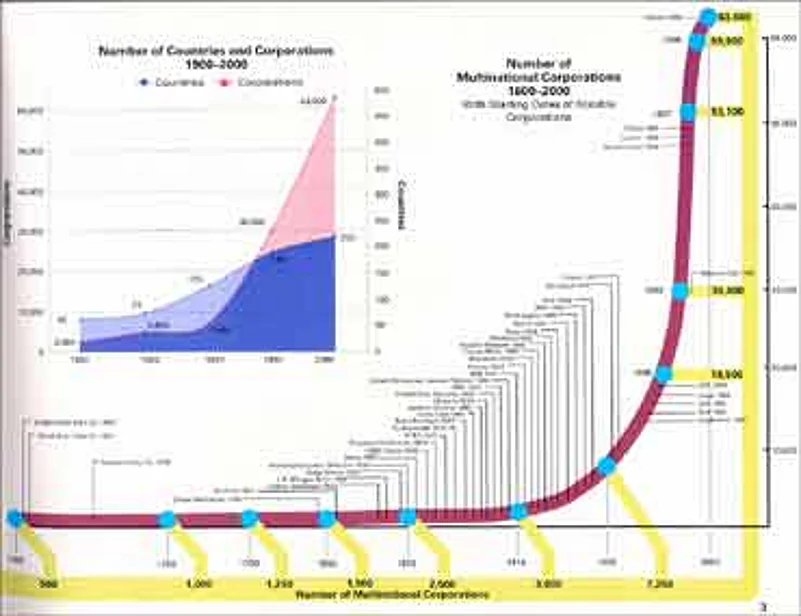NEW HAVEN: Since the massive protests that disrupted the World Trade Organization's meeting in Seattle in1999, not a single international gathering on trade issues has convened without being dogged by protesterscondemning globalization. Everyday newspapers report how globalization is changing people's lives. But what isthis all-powerful globalization? The dictionary defines it as 'an act of making things global in scope andaction'. But who are the actors? Who exactly is 'making things global in scope'? Scholars have debatedendlessly about the phenomenon that has emerged as one of the most contested in our epoch. Finally there is abook - Global Inc - that takes us under the skin of the global economy, offering an X-Ray-like image of thesinews and arteries of multinational corporations. This is not to say multinational corporations are theprincipal force behind globalization, but the extent of their reach and power certainly makes them one of themost important actors.
The inspiration behind this examination of the global economy, the MIT historian Bruce Mazlish, came upwith the idea of the book one day in 2000 when he read a UN report on the power of the modern day Leviathan -the multinationals. It said that of the 100 largest economic entities in the world, 53 were multinationalcorporations (MNCs). Astoundingly, these private companies were wealthier than over 120 nation-states. Giventheir tremendous influence on economies, politics, and culture worldwide, he concluded, getting a true graspon globalization would depend on understanding the nature, historical roots, and functioning of MNCs. Mazlish,who has been leading the New Global History initiative, set about to organize a conference resulting in, amongother things, the book under review - a marvelously produced atlas with short explanatory articles puttogether by business executive Medard Gabel and economic geographer Henry Bruner.
The phenomenon of globalization has shrunk the world and made it increasingly interconnected andinterdependent over the millennia. Driven by technological and economic forces, globalization gatheredmomentum in the fifteenth century with Columbus' discovery of the New World. But it was the emergence of theworld's first multinationals - the British East India Company (in 1600) and the Dutch East India Company (in1602) that truly launched the process that has matured into the current economic integration of the world.With the rapid evolution of transportation technology from horse-drawn carriages to sailboats to containerships, the speed and volume of exchange grew dramatically, linking the world ever-closer together. As theauthors put it, "globalization and global corporation are as interrelated as the chicken and the egg."Without technological advances, corporations would not have been able to spread as far and as wide as theyhave. And without the resources and the drive to use these technologies, the pace of globalization might havebeen much slower.
From a mere three thousand in 1990 the number of multinationals has grown to over 63,000 today. Along withtheir 821,000 subsidiaries spread all over the world, these multinational corporations directly employ 90million people (of whom some 20 million in the developing countries) and produce 25 per cent of the world'sgross product. The top 1,000 of these multinationals account for 80 percent of the world's industrial output.With its $210 billion in revenues, ExxonMobil is ranked number 21 among the world's 100 largest economies,just behind Sweden and above Turkey.

Along with some amazing numbers - portrayed in beautiful maps and charts - about the nature, reach, andpower of the multinationals, this book helps to demolish many misperceptions. Would you guess which country inthe world is the home to the largest number of multinational corporations? It is not the US, Britain or Japan.Some 9,356 multinationals have chosen Denmark as their home, followed closely by Germany Sure, the wealthiestones (93 out of the top 100) are still located in the US, Japan, and Europe, but the automatic assumption thatbig multinationals are American is simply no longer true. In 1962 almost 60 per cent of the world's top 500multinationals were American but by 1999 American corporations accounted for only 36 percent of the total.
Given the power and reach of such corporations, one would imagine them to be large entities. However, theauthors say that most of the 63,000 firms that operate internationally employ less than 250 people, and someservice companies have even fewer workers. After the collapse of the Soviet Union and expansion of theEuropean Community, there has been a phenomenal growth in small companies doing business across nationalborders. Many of the newly emerging economies have surpassed the US in the number of multinationals that callthem home. Compared to 3,387 corporations in the US, some 7,460 MCCs are headquartered in South Korea, and4,334 in Japan. With its $485 billion in assets, the largest multinational of the developing world is HongKong-based Hutchison Whampoa.
The authors note that the multinationals have had some beneficial effects, even if they are "theunintentional by-products of multinational corporations' profit-maximizing activities." They have paidincreasing tax revenues to the government of countries they operate in, provided employment opportunities,offered goods and services that were previously unavailable, and, above all, brought in capital, technologyand management techniques. But the list of the negative impacts of their operations is also long. One of theareas where the power of the multinationals is felt most is in the realm of culture. Since MNCs dominate mediaproduction and distribution - just six corporations sell 80 percent of all the recorded music worldwide - theyintroduce ideas and images that some governments and religious groups fear may destabilize their societies.McDonald's - which boasts 29,000 restaurants in 120 countries - has been accused of promoting an unhealthydiet, although the authors point out that the company has varied its offerings according to local tastes,serving all-kosher meals in Israel and lamb-based Maharaja burgers in India.
The impact of the multinationals, however, goes much further than fashion and food. Because of their cloutin generating jobs and revenues, governments in the developing world compete to win their investment. In theprocess, tax rates, social policies, labor relations, accounting practices, and a whole lot of other thingsget determined by the concerns of multinationals. "Given the enormous influence that large multinationalcorporations wield in today's society through contributions to political campaigns , 'influence peddling', andoutright bribery in many parts of the world," the authors say, "it would not be far-fetched to saythat the power of the large corporation could also be a threat to the democratic process." One can onlyhope that the globalization of telecommunications and the media that multinationals have helped to bring aboutwill also provide the means for critics worldwide to bring attention to the problems created by themultinationals' drive for profit.


























